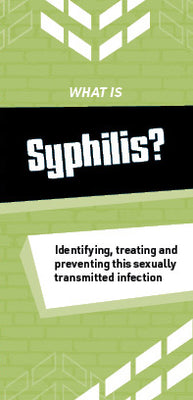What is Syphilis? - HE2576

Identifying, treating and preventing this sexually transmitted infection
The full resource:
What is syphilis?
Syphilis is a sexually transmitted infection (STI). Anyone can get syphilis. It’s becoming more common in many countries including New Zealand. It is a bacterial infection, so the good news is that it can be cured with antibiotics.
How do you get it?
Syphilis is very infectious and easy to catch. It is picked up from someone who has it during any type of sex (oral, anal or vaginal) or even just very close skin-to-skin or genital contact.
You are much less likely to get syphilis if you use a condom every time you have sex. Using a condom doesn’t provide 100% protection against syphilis, which is why it is important to get a regular sexual health check-up anyway if you are sexually active. If you are pregnant, you can also pass syphilis on to your baby.
Why is it important to get tested and treated?
It is very important to be tested and treated as soon as possible. Syphilis is a serious infection. Untreated syphilis will stay in the body and keep causing damage.
It can damage the brain, eyesight, hearing, liver, kidneys, heart, and bones. Having untreated syphilis can also increase your chances of catching any sexually transmitted infections, including HIV. You may miscarry, have a baby born with syphilis, or have a stillbirth if you have untreated syphilis during pregnancy.
How do I know if I have syphilis?
A blood test is the only way of knowing if you have syphilis. Many people who get syphilis have no symptoms and do not know they have it. Some people do get symptoms: the most common early symptoms are painless sores, rashes and swollen glands. If you have had sex without a condom it’s best to be safe and get tested for common sexually transmitted infections.
How do I get tested?
Syphilis is diagnosed by a blood test. In some cases, a swab can also be taken from sores for testing. It is routine to offer a blood test for syphilis in early pregnancy. However, it can take up to three months for the infection to show up on a blood test. So, if you have just had sex with someone who has syphilis, you may be offered treatment even if your blood test comes back clear.
You can ask for a syphilis test at a sexual health clinic, family planning clinic, at your appointment with your general practitioner, and at a youth one stop shop. STI checks are confidential and there is free and low cost testing available for young people. You can use this search tool on the Just the Facts website to find your nearest sexual health clinic.
What is the treatment?
Syphilis is treated with antibiotics, usually by penicillin injection. One dose will cure early syphilis infection – you will need more doses if you’ve had the infection for a while. Other antibiotics are available if you’re allergic to penicillin. You must finish the treatment to be cured. If left untreated, syphilis can go on to cause serious health complications. Getting the right treatment during pregnancy will prevent your baby being born with syphilis too.
You should avoid sex until 7 days after your treatment is finished, and any sores or rashes have healed, so you don’t pass syphilis on to anyone else.
You will need follow-up blood tests for a year after your treatment to make sure you’re completely cured. The blood test can stay positive at low levels for years after you have been cured - this is nothing to worry about.
Who should I tell?
If you find out you have syphilis, you need to tell anyone you’ve had sex with, including oral sex. This is so they can be tested and treated. It is possible to catch syphilis again, even if you’ve already been treated, so you should avoid having sex with them again until they have been treated. You can ask for help from your doctor, nurse or sexual health clinic to notify a previous sexual partner or if you want the notification to be anonymous.
Here are some helpful resources to support contact tracing and notifying previous sexual partners:
- Burnett Foundation How to tell someone you have an STI
- NZSHS Partner Notification
More information
You can get more information about syphilis and other STIs from:
- your doctor, nurse or midwife
- the public health nurse at your school
- Student Health services at your university, polytechnic or school
- youth health clinics in your area
- Sexual Health Services – for clinics in your area, visit nzshs.org/clinics
- Family Planning – for clinics in your area, call (free) 0800 INFOLINE (0800 4636 5463) or visit familyplanning.org.nz
- Just the Facts www.justthefacts.co.nz/sexually-transmitted-infections-stis/
- HealthEd healthed.govt.nz